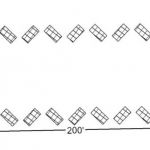Creating Resilient Habitats and Communities on Delaware Bay
Description
The project involves beach restoration and the creation of several offshore reefs. In October 2012, Hurricane Sandy hit NJ causing widespread damage. Amongst the areas impacted were many Delaware Bay beaches that were left without sand and strewn with rubble. These beaches are important spawning areas for horseshoe crabs and, consequently, important stopover points for Red Knot during their migration. To address this loss, the project restored eight beaches, consisting of 2.74 miles of prime habitat. Two thousand and fifty-one tons of rubble were also removed. To protect these beaches from future erosion, five oyster reefs are being built, with four completed as of April 2017. These reefs serve to buffer wave energy, helping to keep sand on the beach, and have created habitat for oysters and other species. Reefs are made out of bags of whelk shell placed in the intertidal zone in a saw tooth pattern. This design was chosen because it does not impinge horseshoe crab movement. Preliminary data show the reefs to reduce wave energy by up to 40%. Restored beaches have higher horseshoe crab egg densities. There has also been an increase in use of NJ beaches by Red Knot since the restoration.
Technical Details
Each reef consists of a double row of mounds of whelk shell arranged in a sawtooth pattern with five foot gaps between the mounds. Whelk shell is first bagged using polypropylene netting, and these bags are used to construct the reef. It takes approximately 2,500 bags of whelk shell per reef. For beach restoration, a coarser grain sand was placed to create a minimum depth of 16” of sand on each beach.
Funding
Funders include the National Fish and Wildlife Foundation (NFWF), the Department of Interior/US Fish and Wildlife Service (USFWS), the William Penn Foundation, and the Geraldine R. Dodge Foundation. Project partners include the American Littoral Society, Conserve Wildlife Foundation of NJ, Stockton University Coastal Research Center, and LJNiles Associates.
Project Link
Contact
- Captain Alek Modjeski
- This email address is being protected from spambots. You need JavaScript enabled to view it.
